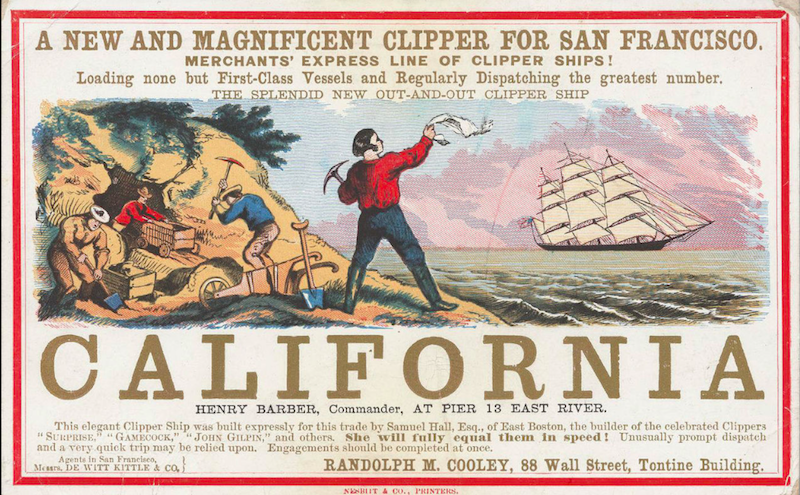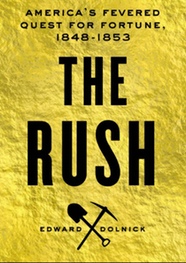Why Americans First Ignored the Discovery of Gold in the West — And then Ran Screaming for It!

The key to the Gold Rush story, the single most important fact of the whole saga, is that Americans in 1849 had never experienced such a thing. For them, the frenzied talk of gold was new and shocking and overwhelmingly exciting. Americans today have been inoculated by cynicism — we know in our bones that bonanzas and stock market frenzies break hearts as well as bestow fortunes — but nineteenth century Americans had no such protection. When the golden seductress whispered her honeyed promises, farmers, shopkeepers, and craftsmen fell in droves.
 The lure was money,
beyond a doubt, but freedom played nearly as large a role. You didn’t have to
follow behind a horse for the rest of your life or copy legal forms in an
office or live under your father-in-law’s thumb. You could leap out of the rut
that fate had assigned to you. If you had nerve and luck and ambition, you
could get rich.
The lure was money,
beyond a doubt, but freedom played nearly as large a role. You didn’t have to
follow behind a horse for the rest of your life or copy legal forms in an
office or live under your father-in-law’s thumb. You could leap out of the rut
that fate had assigned to you. If you had nerve and luck and ambition, you
could get rich.
This was new in American history, and astonishing. The Declaration of Independence had given every American the right to pursue happiness. The gold rush promised the chance to catch it.
All this ran counter to two things that everyone knew. One was that you earned your living by the sweat of your brow, a penny at a time. The other was that calamity could swoop down at any moment. Jobs, savings, and homes could vanish overnight. In an age with no understanding of germs or bacteria or infection, parents who had not seen a child die were unusually fortunate Mothers and fathers watched helplessly as scarlet fever or whooping cough or measles picked off one of their children, and then another, and then another.
So when news came that life could change overnight, for the better, no one believed it. For six months Americans ignored the rumors or scoffed at them. The only way you made money from land, everyone recognized, was to clear it and plow it and tend it. Now came word that all you had to do was bend over and pick up a fortune at your feet.
What turned the story around was the President himself, in the State of the Union address, declaring that the rumors were solid fact. Two days later, the War Department put chunks of California gold on display for the public to gawk at.
And then the dam burst. From every country in the world, crowds poured into California. From America alone, one percent of the population headed to the gold fields. That would be the equivalent of 3-million people today all quitting their jobs, leaving their families, and taking off to, say, the tip of South America.
They had not the least notion of what they were in for. Once across the Missouri River, one historian wrote, “civilization ended and the Middle Ages began.” And, because the trip was expensive, lots of emigrants were clerks or lawyers or doctors, greenhorns rather than outdoorsmen. They shot one another by accident. Their mules ran off. They tried to cross a river and drowned. They tried to take a shortcut and starved.
The farther they went, the worse it grew. Prairie gave way to mountains, then deserts, then steeper mountains. “The desert!” one gold-seeker moaned. “You must see it and feel it in an August day, when legions have crossed it before you, to realize it in all its horrors. But heaven save you from the experience.”
The west would change in a twinkling. Bronco Charlie Miller, the last of the Pony Express riders, lived to see gas stations and all-night diners where once he had clung to his pony’s neck while dodging Indian arrows. One of the first white settlers in the northwest traveled overland to Oregon Territory in 1852. In his old age, he flew in an open cockpit airplane over the same route he had once inched along in an ox-drawn wagon.
The gold rush is American history on fast forward. In 1848, San Francisco’s population numbered a mere 812. By 1851, San Francisco was a metropolis of thirty thousand, clamorous with the growl and lilt of a dozen languages. “I am among the French and Dutch and Scotch and Jews and Italians and Swedes and Chinese and Indians and all manner of tongues and nations,” one new arrival marveled in a letter home.
It is not only a story set in America but in important aspects the American story. Many of the great themes play out on center stage — the journey west in search of a better life; the collision between races and nationalities; the ingrained faith that tomorrow will vastly outshine today; the focus on material success; the omnipresent, taken-for-granted violence; the proud belief that America is the land of the self-made man who makes his way by luck and pluck rather than by blood or birth.
In the sense that California is like the rest of the United States, only more so, the story of the gold rush is the American story, only more so.